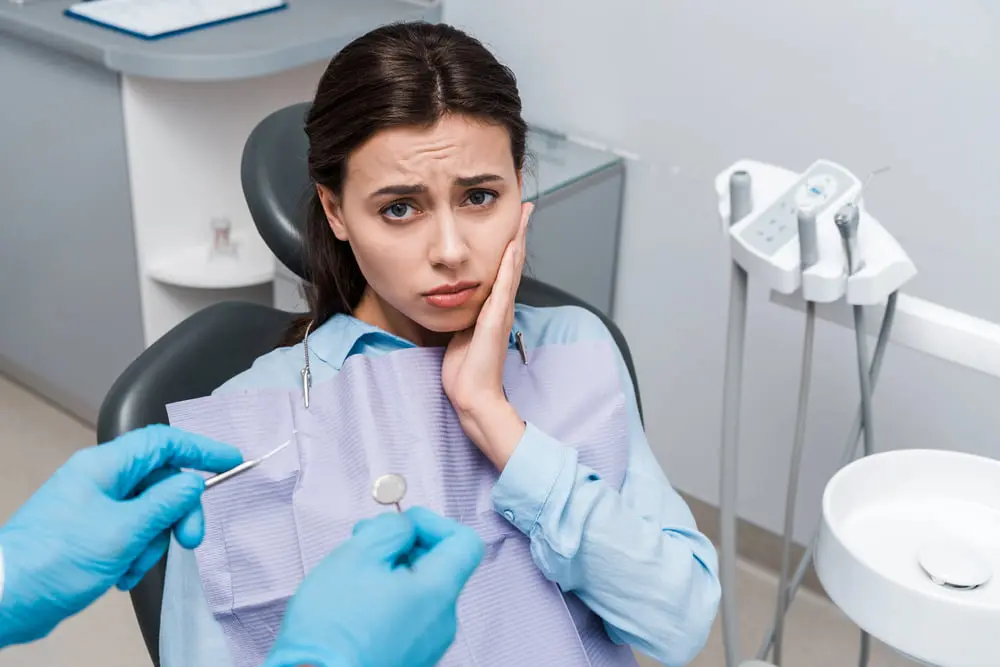Common Orthodontic Problems in Madison, AL

Orthodontic problems significantly impact both dental health and aesthetics, thereby influencing individuals’ overall well-being and confidence. Common orthodontic problems in Madison, AL encompass a range of conditions such as malocclusions (misaligned teeth), crowding, spacing, and abnormal jaw growth patterns.
If left unaddressed, these problems can lead to various complications including tooth decay, gum disease, difficulty in speaking or chewing, and an unsightly appearance. Moreover, they may also contribute to headaches, face or neck pain. Therefore, the role of orthodontic treatment is crucial in improving not just oral health and function, but also the aesthetic aspect, ultimately enhancing the residents’ quality of life.
In Madison, AL, several common orthodontic problems are prevalent, including malocclusions such as:
Upper Front Teeth Protrusion (referred to by patients as Overbite, or Overjet by orthodontists):
Occurs when the upper teeth overlap significantly with the lower teeth. Learn more about overbite here.
Underbite
it is the opposite condition, where the lower teeth extend past the upper ones. Learn more about underbite here.
Crossbite
Refers to a lateral misalignment of the dental arches, and crowding is the lack of space for all the teeth to fit normally within the jaws.
Crowding
It is the lack of space for proper alignment leading to malposition of teeth.
These orthodontic problems can significantly impact oral health and overall well-being. They can lead to difficulties in maintaining oral hygiene, increasing the risk of tooth decay and gum disease. These conditions can also cause discomfort, impair normal chewing and speech, and result in self-esteem issues due to aesthetic concerns. Therefore, addressing these orthodontic problems is crucial for maintaining both oral health and overall well-being.
Causes and Effects of Common Orthodontic Problems
Orthodontic problems, prevalent in Madison, AL, have a myriad of causes and effects that significantly impact dental function and oral hygiene. These issues often stem from genetic factors, poor dental habits, or accidents that result in malocclusions, overcrowding, or misalignment. The effects of these orthodontic issues are multifaceted, with direct implications on individuals’ oral health and overall well-being.
Dr. Alex Levine, a highly recommended orthodontist in Cape Coral, FL, stated that misaligned or overcrowded teeth, for instance, can lead to difficulties in chewing and speaking, increased susceptibility to tooth decay, and periodontal disease due to the challenge in maintaining proper oral hygiene. Moreover, these problems can contribute to self-esteem issues, given the aesthetic importance of a well-aligned dentition. Therefore, understanding the causes and impacts of common orthodontic problems is critical in devising effective treatment strategies and preventative measures to enhance oral health outcomes in Madison, AL.
Treatment Options for Common Orthodontic Problems
In Madison, AL, a range of treatment options are available for common orthodontic problems such as malocclusion, overcrowding, wide gaps, overbite, underbite, and crossbite. The options at Orthodontic Design Co. encompass custom traditional metal braces, custom ceramic braces, Inbrace lingual braces, and clear aligner therapy, such as Invisalign.
Each treatment option carries its unique advantages tailored to different lifestyle needs and preferences. Furthermore, it is imperative to underscore the significance of customized treatment plans. Every patient presents with unique dental characteristics and goals, necessitating a personalized approach to orthodontic care.
By developing a customized treatment plan, orthodontists can effectively address individual patient needs, thereby enhancing the efficacy of the treatment and ensuring optimal dental health and aesthetics.
Impact on Aesthetics and Self-Confidence
Orthodontic problems, prevalent in Madison, AL, significantly impact the aesthetic appearance of individuals, leading to potential psychosocial consequences. Malocclusion, crooked teeth, and other orthodontic irregularities can distort the harmony of facial features, detracting from the individuals’ physical attractiveness. This aesthetic deviation from societal norms often triggers psychological and emotional distress, notably undermining self-confidence and social interactions.
Individuals with orthodontic problems are frequently victims of social stigmatization and ridicule, which negatively impacts their self-esteem. The resultant self-consciousness and embarrassment may lead to avoidance of social situations, thereby fostering feelings of isolation and depression. Thus, the implications of common orthodontic problems extend beyond mere physical appearance, deeply influencing the psychological wellbeing and social life of the affected individuals in Madison, AL.

Schedule a Free Orthodontic Consultation with Dr. Reynolds at Orthodontic Design Co.
Scheduling a free orthodontic consultation with Dr. Reynolds is a critical step towards ensuring optimal oral health, particularly for children. Early intervention in orthodontics can lead to better oral development, preventing overcrowding, misalignments, and bite problems that could potentially result in more serious dental issues later in life.
Dr. Reynolds offers expert advice and guidance, helping to identify any potential issues at an early stage. This proactive approach not only enhances the effectiveness of personalized treatment plans, but also minimizes the duration and cost of these treatments. Therefore, it is highly recommended to take advantage of this free consultation to maintain and improve your dental health.
What do most orthodontic problems arise from?
Most orthodontic problems primarily arise from genetic factors and developmental issues. These include malocclusions such as overbites, underbites, crossbites, and spacing issues, which are often inherited traits. Additionally, certain habits during childhood, such as thumb-sucking, prolonged use of a pacifier, or tongue thrusting, can also contribute to the development of orthodontic problems. Furthermore, premature loss of baby teeth, accidents, or a variety of health conditions can lead to misalignment of teeth and jaw-related issues. It is crucial to identify and address these issues at an early stage to prevent further complications.
Frequently Asked Questions
© 2025 Best Orthodontist in Madison and Huntsville. Braces Invisalign Orthodontic Design Co. Ortho Dr. Adam Reynolds. All Rights Reserved.
Privacy Policy | Accessibility Statement
Friday: 8:30am – 4:00pm
Saturday & Sunday: Closed
Online Service Hours
Monday - Friday: 7:00am – 7:00pm
Saturday & Sunday: 7:00am - 5:00pm
Powered by Orthodynamo Orthodontic Marketing